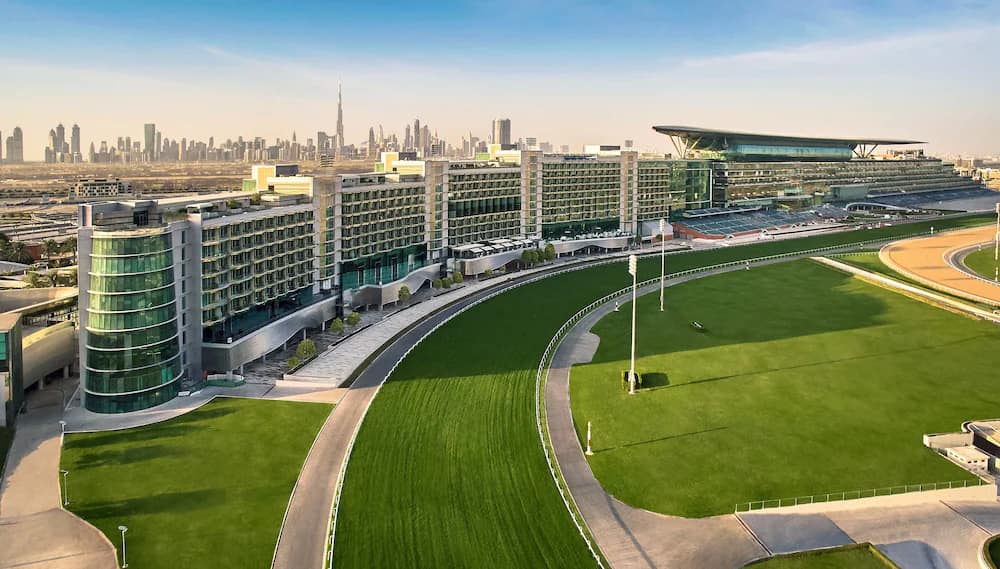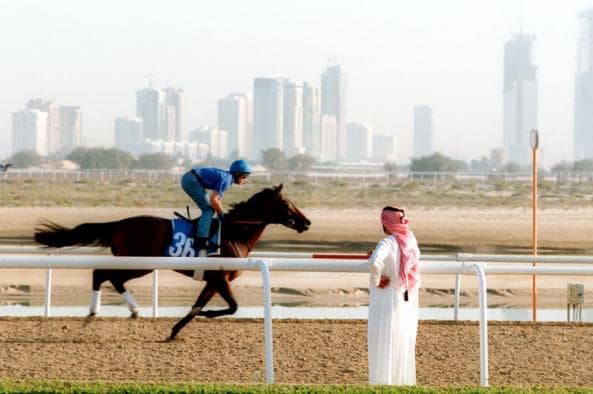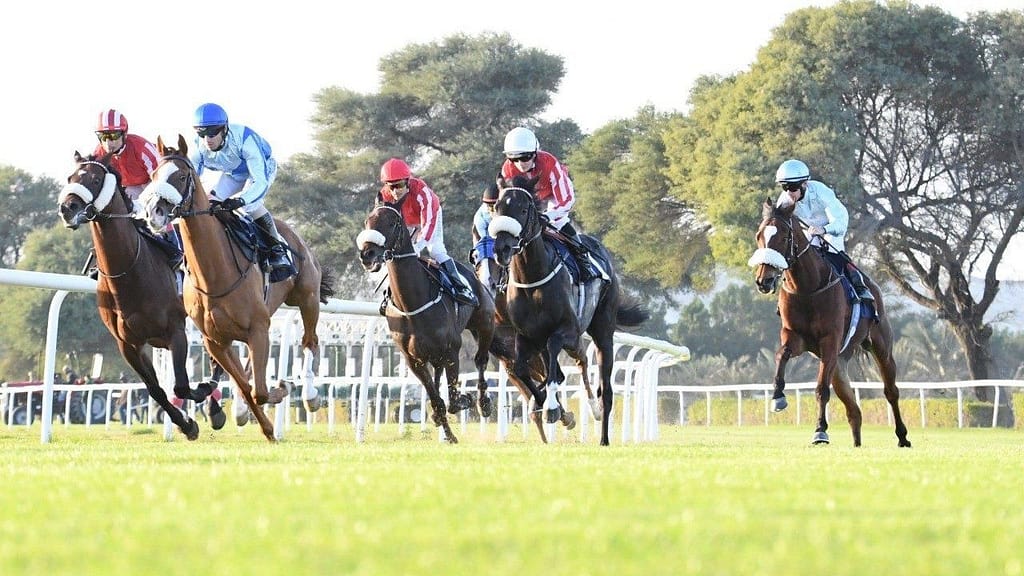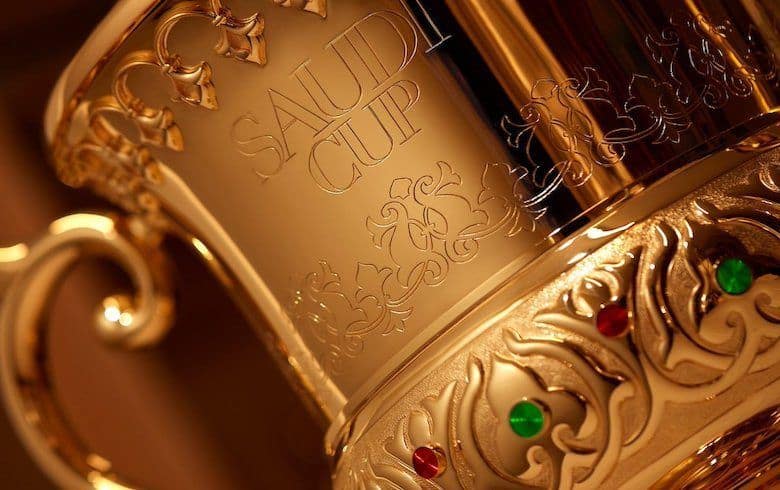
For some time now, racing authorities in Dubai, Bahrain and Saudi have been deep in talks focused on collaboration, expansion, and knowledge sharing.
Although we will have to wait for further details (expected in 2022), it is no exaggeration to state the outcome of these could, quite possibly, change the face of regional and global flat racing forever.
“When it comes to racing, Dubai is the role model for the entire GCC,” says Equitrans managing director, David Robson. “We have all the bases covered, just think about the quality horses produced by Godolphin, the global prestige generated by the Dubai World Cup and the world class facilities available at Meydan,” he says.

As a long-time race steward at Meydan, David knows the industry well. “Of course, our neighbours have seen just what can be done in the region and would like to use horse racing to put their country firmly on the world map.”
“In terms of high quality racing, Dubai is head and shoulders above the other GCC countries. It should be noted, that one day of racing could not take any country to the highest international standards overnight, the bigger picture is really about the quality and investment a country is willing to make to create an international sporting event.”
“The quality of horse racing, starts from the quality of horses you breed, buy, train and race. To attract top horses and trainers, you need to employ experienced professionals and lay the right surface.”
Could this be the kind of evolution Dubai’s racing vision requires to pivot to the next level? The city has certainly achieved a lot on its own, yet to further enhance its racing, could it now be looking to share its wealth of knowledge and experience with other GCC countries?
Since late spring 2021, the Racing Clubs of Dubai, Bahrain and Saudi Arabia have been in collaboration discussions, working through details, yet to be released. It is understood that the three countries are working towards creating a truly superlative Middle East winter racing season, with the aim of attracting the biggest and best from around the globe.
David says, “from an International perspective, Dubai has been the winter attraction for many years, then came Qatar, with Saudi and Bahrain growing aggressively in the last two to three years. Both countries have strived to attract international participation in their racing and worked hard to upgrade themselves to the top level in IFHA.”
“It would seem the flat racing attraction that once belonged entirely to Dubai is soon to be shared with other GCC nations. I believe the plan, moving forward is to work together and complement each other, leading ultimately to a well-established horse racing circuit much like we have seen with the F1 in the region.”
“I believe initially the target will be Europe and the UK,” David says. “If they keep it on turf, keep it mid distance and space the meetings out nicely, it should work well. There are very few high- value European races during winter, and I think this will certainly attract British, Irish and French based trainers and owners to the GCC.”
However, before this can happen, current health and veterinary regulations and logistical barriers will need to be improved, together with the implementation of standardised regional regulations and compliance. Talks will need to address many issues of cross border movement of horses involving quarantine and health requirements, compliance, as well as combined efforts for race scheduling and the sharing of knowledge and information among jockey clubs, owners and breeders in the three countries.
Yet, once these details are eventually finalised, a glittering winter season of racing should become possible for both local and international horses, offering more racing on the winter calendar.
Each of the three countries participating already stage high profile international racing. The Bahrain International Trophy in November, The Saudi Cup at the end of February and the well-established Dubai World Cup Carnival and Dubai World Cup, spans from January to March.

Racing in Dubai
There can be no disputing Dubai’s racing dominance, not just regionally but worldwide. Yet it all began on a dusty camel track only 40-years ago.
Today the city is home to one of the world’s most prestigious and richest races in the world; The Dubai World Cup (DWC). The annual DWC carnival is hosted at Meydan the world’s largest integrated racing facility with seating for over 60,000, while the Godolphin Stud, owned by Sheikh Mohammed Bin Rashid Al Maktoum leads globally in breeding, purchasing, training, and racing across four continents.
The city continues to innovate with an increase in the season prize pot to over $40 million, new investment in Emirati stewards and the Middle East’s first ever breeze-up sale to be held in 2022.
Racing in Bahrain
In October 2021 Bahrain was upgraded to a Part II country (from Part III) in the International Cataloguing Standards (ICS) Book by the International Grading and Race Planning Advisory Committee (IRPAC).
Bahrain’s horse racing programme is rapidly evolving following the success of the third running of the Bahrain International Trophy (recently upgraded to Group Three) in November and the addition of the new Turf Series to be introduced in December 2021.

The new series will consist of ten £50,000 handicap races that have been added to the existing 2021/2022 Imported Race Programme, the aim of which is to encourage international horses rated between 85-100 to come and compete in the Kingdom.
Bahrain is seriously committed in developing its flat racing internationally and has invested in developing more barns for quarantine and applied to the OIE for an upgrade of African Horse Sickness, which will be beneficial in many ways for imports and especially exports to Europe.
Racing in Saudi Arabia
This year, Saudi Arabia too has been upgraded to a Part II country (from Part III) in the International Cataloguing Standards (ICS) Book by the International Grading and Race Planning Advisory Committee (IRPAC).
Although it only launched in 2020, the world’s richest horse race, The Saudi Cup ($20 million), has now been upgraded to Group One status, with the additional races held during the festival upgraded to Group three.

Prince Bandar bin Khalid Al Faisal, Chairman of the Jockey Club of Saudi Arabia, said recently, “the elevation of the Cup to Group 1 status is a sign not just about the event itself but more widely a sign of how the industry as a whole has developed here. Saudi Arabia has more to offer racing nationally, regionally and internationally in the coming years.”
He continued, “with an increasingly attractive racing offering already taking place across the region, we decided as a group that it was time to focus on ways to open up our racing to each other while simultaneously making it more attractive for internationals to come here, facilitating the progression of racing standards across the entire region.”
“We are in the preliminary stages of these talks which will initially take place between Saudi Arabia, Bahrain and the United Arab Emirates but we are laying the foundations for a Gulf-wide cooperation that will benefit all of us and, we hope, the racing world at large, offering summer and winter racing in the Middle East.”
Regardless of the outcomes of the current talks and when they will likely be announced and implemented, it would appear we are entering a truly exciting new era in regional racing, one of collaboration, expansion, knowledge sharing and investment.
Specialised GCC Horse Transportation
To complement the Equitrans GCC equine air-transport service, we have recently launched our regional road transport option. Equitrans now offers a seamless service linking the Region’s biggest equine events and sporting hubs, with a highly cost-effective yet premium horse transportation solution.
Whether clients choose to move their horses by road or flight, the Equitrans commitment to customer care remains the same. Our road customers still receive a dedicated operations consultant throughout the transportation process, can still expect the same commitment to quality communication and can feel safe in the knowledge that their horses are being cared for by Equitrans’s own experienced and trained professionals.
By combining high-quality vehicles, the finest horse care and of course the considerable savings afforded by road travel when compared to flights, Equitrans has effectively changed how horses’ transit through the region for competitions, breeding and sales.
To find out more about both the Equitrans flight and road transport options please visit here